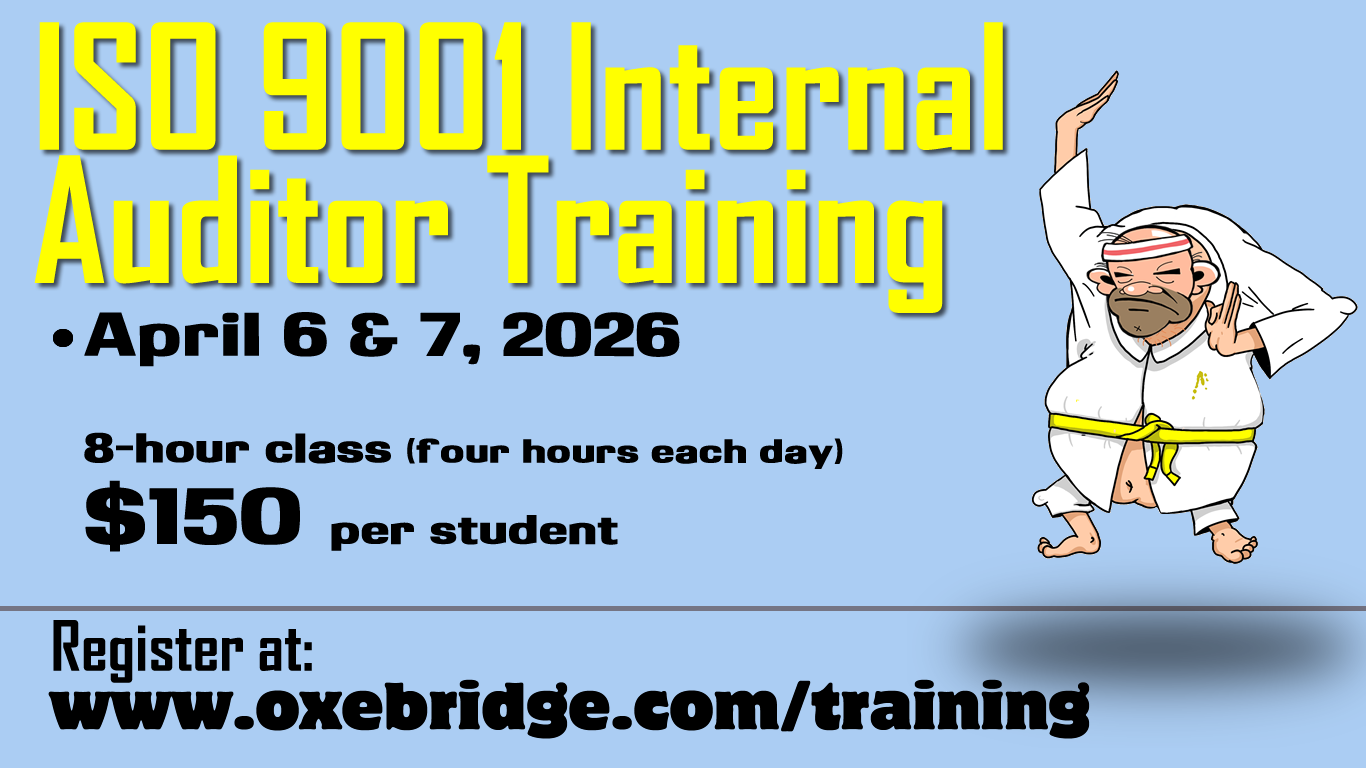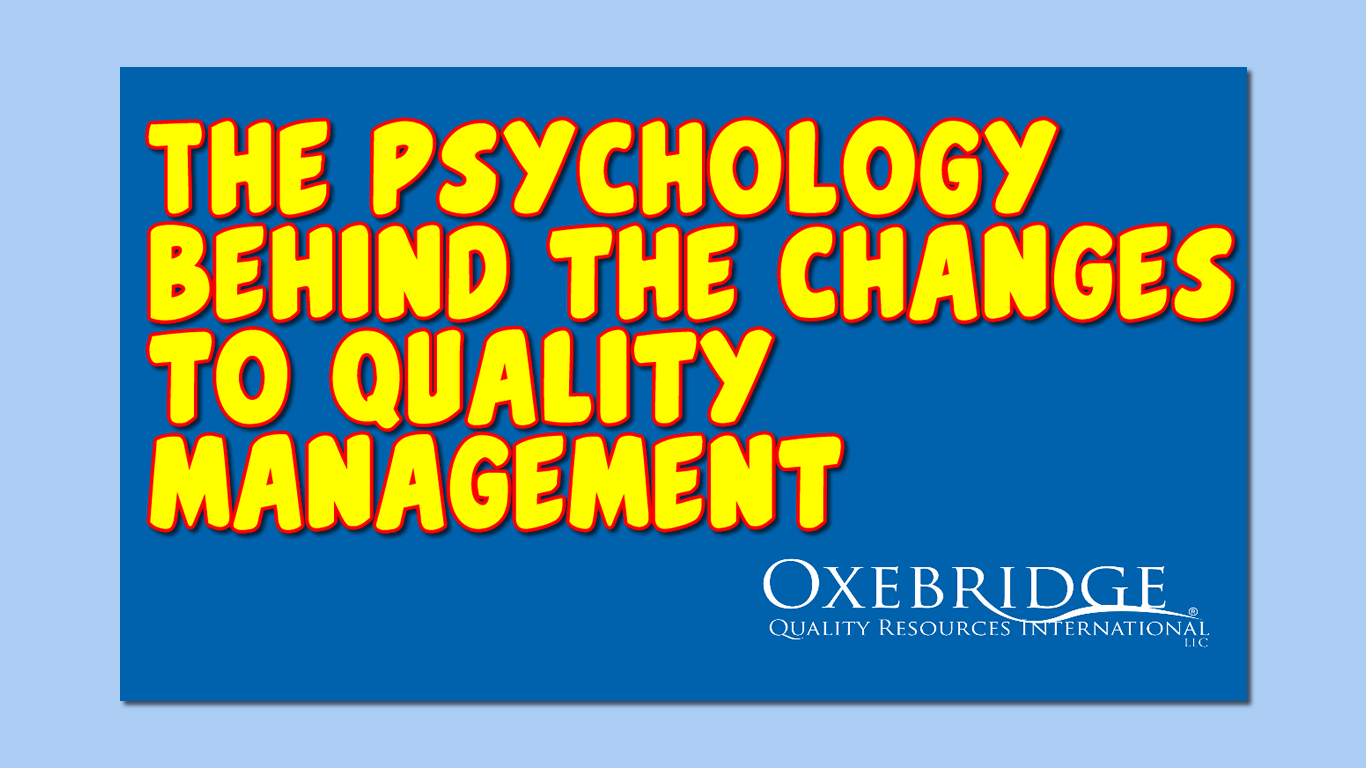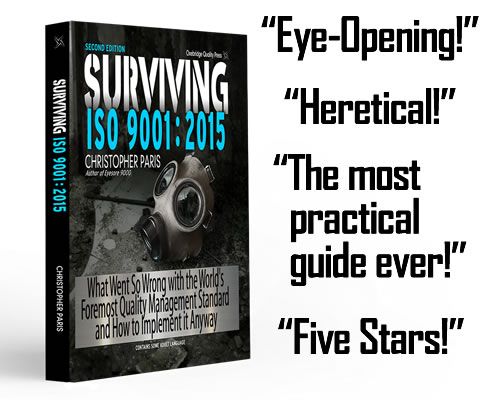 by Christopher Paris
by Christopher Paris
VP Operations
I, no doubt like many other leading consultants in the ISO 9001 and related standards fields, received an invitation from Standards.org, a new site that aims to act as a one-stop portal for organizations seeking information on standards and certification. Keeping with the usual Oxebridge aim at remaining transparent and honest, I have to say that the email offered a free, limited profile in exchange for a press release on our site.
(Let’s see how many of the other guys open with that disclaimer.)
I get these offers every once in while, and have — for the past decade or more — dismissed them as meaningless spam and netbabble. But I tend to check them anyway. One site — I forget the name now — got my interest a few years ago, but I waited it out and sure enough, the site was dead in a month. Standards.org looks different, though, because it promises to provide news and information for ISO 9001 end users free of charge. Let’s take a look.
Our Quality “Press”
One of my biggest gripes regarding our profession has been a lack of a proper source for news that (1) wasn’t beholden to its advertisers, and (2) was either free, or at least reasonably priced, for end users. Look at what we’ve had to date.
Our industry has been saddled with the self-promoting propaganda of ASQ’s Quality Progress, which provides some decent content on occasions, but which requires readers to sift through reams of junk ads, sneaky adv-itorials, grossly inaccurate and worthless salary surveys, and incessant “articles” (read: more ads) for their dubious professional certification schemes. (Full disclosure: I was published there.) Don’t get me started on Quality Progress‘ almost religious prostrating in front of the altar of Six Sigma, one of the biggest scams to infect the quality profession since someone squeezed a snake into a glass phial.
Then there was Quality System Update. (Full disclosure: I was published there, too.) It provided an excellent source of news, largely because publisher Paul Scicchitano was given access to virtually every ISO 9001 and standard related body on the planet, in an overt (and sometimes publicly acknowledged) attempt to exchange his access for favorable press. Such was (is?) Paul’s influence, he was given a voting membership seat on the US TAG to TC 176, and is still often cited as an ISO 9001 “expert” even though he has no experience in implementing, training, consulting or auditing any quality system whatsoever. It was like handing the keys to a Formula 1 race car to the guy who washed them, citing his “automotive experience.”
Regardless of its origins, this access resulted in QSU having some of the best news on standards and certifications out there. The problem was that the monthly journal was ungodly expensive, costing hundreds of dollars for a pretty slim slicing of tree pulp. That put it out of bounds for anyone but large corporate buyers and registrars, meaning the news never got into the hands of the people who needed it most.
And, yes… this is the same Paul Scicchitano who was nominated for a Pulitzer Prize for “editorial excellence”. He didn’t win.
Now QSU has morphed into the garble-named Sustainable Success Alert (I am betting they are attempting to get on the buzzword bandwagon with the term “sustainable” in the same way so many organizations postured around words like “lean” and “agile” in recent history.) But SSA follows the same incomprehensible business model as QSU, offering limited free content on its site, topped by a massively expensive subscription price.
Quality Magazine, meanwhile, suffers from a more simple and traditional problem: they will report nothing in the least bit controversial, and since most news has a “controversy” component to it, it only runs the most tepid press releases. The problem is that when it comes to real news in the standards world, some of it is controversial. Instead of constantly quoting John Surak on the merits of food standards, someone needs to ask him why so many of the companies in the news that have poisoned (and killed) people with tainted meat and salmonella had HACCP programs in place. Someone needed to ask NASA about how the Space Shuttle Columbia blew up, killing seven astronauts, the a year after the organization began a massive rollout of AS9100. Instead, we learn that ABC Widget Co. installed a new $10,000 CMM in their QC lab. Yawn.
In the past QM was also saddled with content tied to its publishing house’s other releases, like books and seminars. I admit to not having read it in a long time, so can’t comment on what it is like now.
Enter Standards.org
Will Standards.org be better? The answer is… not sure.
The model is different. Content contributors, such as registrars, standards bodies and consultants, pay a reasonably-priced fee in order to be able to submit news and articles. Editors keep an eye on the content to make sure it’s relevant, etc. The good part is that it remains free to readers… no subsription costs at all, whether small or horrific like our current crop of news sources. Operating costs are paid by site advertisers and content contributors.
Because the site offers submitted news, there is the potential, therefore, that it will turn into nothing but a repository for self-indulgent puff pieces, and bore readers to death. After all, how many times can we read about which company SGS or UL recently awarded an ISO 9001 certificate to?
But every news outlet always requires a reader to sift through the junk to get to the news that he or she is seeking. And an early look at the beta release of the site shows some interesting articles. Yes, these are all probably available in other venues, but you’d have to go to a lot of sites, or read a lot of magazines, to get them all in one place… and remember, it’s all free. I like that convenience, and you can’t beat the price.
News, Skews or Snooze?
The challenge will come when someone — say a plucky implementation firm known for making news by holding ISO and the registration scheme accountable to the rules they themselves are supposed to adhere to — submits a piece that might make one of the other contributing bodies … er, “wince”. If Standards.org was around when NQA was forced to acknowledge that, no, their auditors can’t issue major nonconformities to AS9100 standards that haven’t actually been published yet, and Oxebridge submitted a press release about the incident, would the site have published it, if NQA was another contributor?
What about when we got ACHC to actually re-write their Medicare standards after reporting that their auditors were writing nonconformities that could result in worker injury? And don’t get me started on the SGS / Zach Pivarnik “inquisition” fiasco. If SGS or ACHC were contributors, would the pieces get published?
I asked Standards.org founder Calan Horsman what made his site different:
I don’t believe there is any similar website serving the compliance industry. [Our] goal is to make the site the de facto destination for finding information and resources on international standards, both for those seeking certification and for those in industry to stay up to date with news and jobs. All information presented on the website will always remain free to view, the only cost will be to publish content.
While the site is more than just news — it features links to consultant, registrar and trainer resources for standards users, as well as a jobs listing feature — since they asked for a news piece, it’s worth focusing on this subject.
No matter where the news comes from, at some point someone is going to submit a piece that steps on the toes of someone else in the contributor pool; after all, even newspapers have to report negative stuff about themselves. Standards.org has an impressive roster of folks on their advisory board, which is refreshingly absent of the usual ten or twelve faces (here, here, and here) we see in every US-based organization having anything to do with ISO 9001. It even features actual, real users of standards — like actual QA Managers! — instead of the so-called “expert” consultants who have never actually worked under a quality system that they claim to be experts about, and whose main expertise is navigating through the hotel conference room buffet line to find the freshest donut. So perhaps they have the structure to manage such ripples. But having structure, and having fortitude, are two different things. Let’s see how this plays out.
For now, it’s a great — and free — resource.
Christopher Paris is founder and VP Operations of Oxebridge Quality Resources International. He is a former member of the US TAG to TC 176, a Senior Member of ASQ, and has personally implemented over one hundred ISO 9001 and AS9100 systems over a 22 year career. His ISO 9001 parody EYESORE 9000 has been downloaded over 250,000 times, and he, too, has never won a Pulitzer.
Christopher Paris is the founder and VP Operations of Oxebridge. He has over 35 years’ experience implementing ISO 9001 and AS9100 systems, and helps establish certification and accreditation bodies with the ISO 17000 series. He is a vocal advocate for the development and use of standards from the point of view of actual users. He is the writer and artist of THE AUDITOR comic strip, and is currently writing the DR. CUBA pulp novel series. Visit www.drcuba.world







